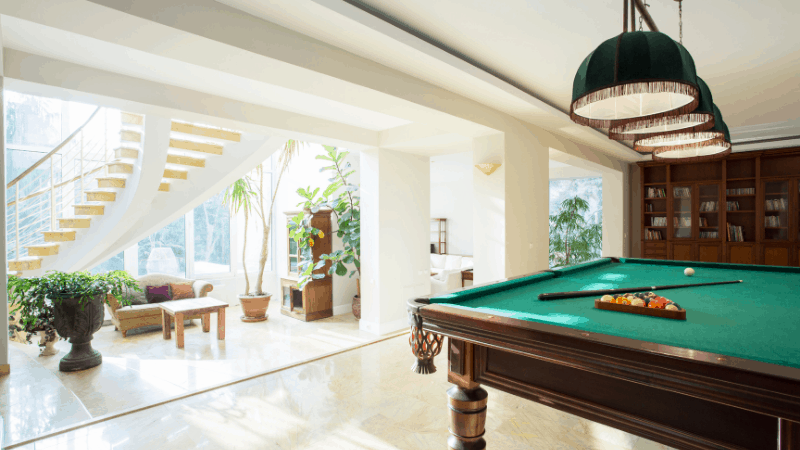If you are one to keep your pool table in the garage or out on a covered patio and live in an area that sees cold weather in the winter, you may want to rethink your decision. It’s well-known that you should keep a pool table out of the rain and snow, but temperature is also a factor in maintaining the integrity of your table.
High-end pool tables made from quality hardwoods with a slate bed will be fine regardless of how cold it is. However, cold weather can cause the wooden parts of many pool tables to bend and warp, creating an uneven playing surface.
Whether you are looking to add some entertainment to your patio or lack room for your pool table indoors, it’s important to know how cold weather will affect this expensive piece of furniture. Below, we’ll tell you just how much cold weather can hurt a pool table and what to consider instead.
Does Cold Weather Hurt Pool Tables?
Pool tables need a balanced climate in order to function properly. If the climate falls either too hot or too cold, this could damage the wood or felt, and the pool table will not work as well as it should.
The pool tables found in many homes are mostly composed of wood which means they are affected by the climate. Why? Well, wood is a natural material that expands and contracts to depend on the temperature. After enough expansions and contractions, your pool table can start warping and twisting. This will make your pool table uneven, unlevel, and unusable for the most part.
How Do Cold Temperatures Affect Pool Tables?
While the temperature does play a big role in the expansion and contraction of wood, it is not actually directly the cause. Moisture actually causes the contracting and expanding of the wood—the more water there is in wood, the more it will expand or contract.
The wood on your pool table will warp over time due to changes in moisture levels. Encountering different levels of humidity can cause it to shift and bend. When wood is exposed to moisture in the air, it can continue giving out the moisture until a balance between the two conditions is reached. This changes as the wood dry, causing various shifts to its structure.
If you are worried about the cold affecting your pool table, it’s best to look for a pool table made from wood that doesn’t move too much with temperature changes, such as cherry or oak.
Does Temperature Even Matter?
So, if moisture is the cause of warping, what does temperature have to do with it?
Wood is a natural substance that is constantly changing in response to its environment. It absorbs and releases moisture depending on the surrounding humidity level, which affects whether it expands or contracts.
Wood doesn´t directly contract or expand because of the surrounding temperatures but because of its internal humidity level.
However, humidity levels depend greatly on temperature. Air temperature affects how much water vapor the air can hold. Cold temperatures can hurt your pool table by decreasing the amount of moisture content, causing the wood to contract.
Temperature fluctuations can also affect the slate of a pool table. Slate tends to “sweat” as its temperature rises, especially if it moves from extremely cold temperatures to warmer ones. This moisture could gather in the felt of the pool table, causing damage.
Ways to Work Around Cold Weather
If keeping your table in an area exposed to the cold is your only option, we have a few tips that may help you out.
Buy an Outdoor Pool Table
There are plenty of pool tables available that were designed to weather the elements. Outdoor pool tables are usually made with treated wood or other materials like plastic or metal that don’t warp from moisture and temperature changes.
The downside to these tables is that they typically have a hard playing surface instead of the felt we are all used to, making play more difficult.
Invest in Patio Heating
Depending on your setup, adding heating elements to your patio or garage could provide some protection to your pool table. Installing heated floors or heat lamps can help regulate the temperature and humidity in the area and possibly save the wood from warping.
Store Your Pool Table in the Winter
If you’ve got great weather most of the year, but the winters get extremely cold, you may want to consider storing your pool table during those months.
The problem here is that pool tables are heavy and can be a pain to move. Not to mention, this could expose your table damage in the process. And while there are services that can help you move your pool table, they can be pricey.
Bottom Line
When it comes down to it, unless you have a pool table specifically designed for the outdoors, leaving it exposed to the cold can hurt the table by warping the wood and damaging the felt. Your best bet is to keep your table in a climate control space if you want it to last for years to come.

